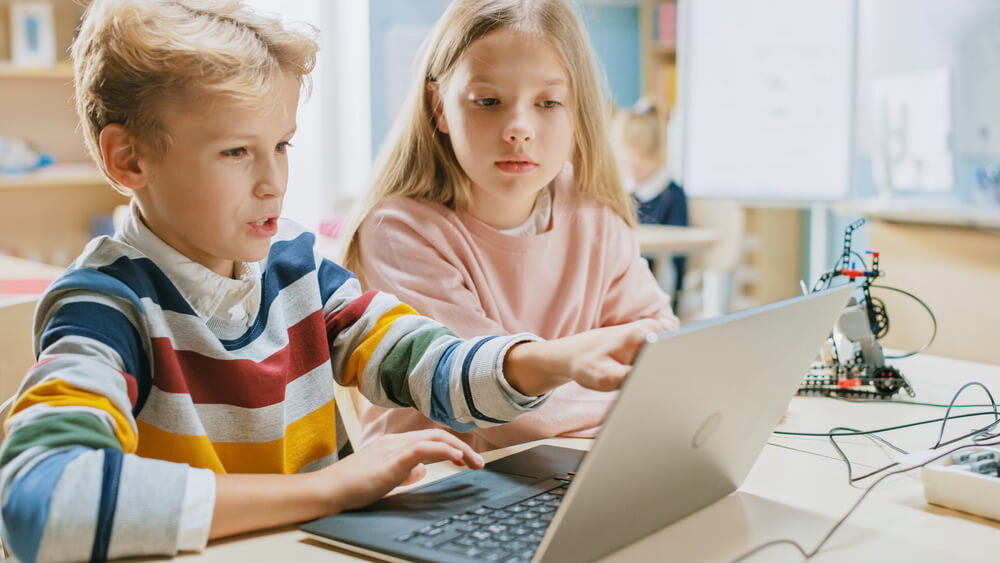Making Coding Fun: Engaging Methods That Keep Kids Motivated to Learn

Posted by amandaglitz3
from the Education category at
19 Feb 2025 12:45:01 pm.

In today’s digital age, coding has become an essential skill for children, helping them develop problem-solving abilities, creativity, and even teamwork. However, one of the biggest challenges when teaching coding to kids is maintaining their interest and motivation. Coding, at first glance, can seem daunting and complex, but with the right approach, it can be an incredibly fun and rewarding experience for young learners.
This article will explore engaging methods to make coding enjoyable for kids, while also ensuring that they develop the skills and confidence to succeed. Whether it’s through game-based learning, real-world applications, or hands-on projects, there are numerous strategies that can turn coding from a chore into an exciting adventure. We’ll also take a look at how coding can shape their future, giving them valuable skills that go far beyond the screen.
For those looking for professional guidance in introducing coding to children, Junior Coderz offers coding classes for kids. With an engaging and fun approach, Junior Coderz provides a supportive environment where young learners can dive into coding at their own pace. Whether it’s through group classes or personalized tutoring, Junior Coderz is committed to making coding accessible and enjoyable for every child.
Why Making Coding Fun is Essential for Kids
Before diving into the methods, it's important to understand why making coding fun is so crucial for young learners. Coding is often compared to learning a new language, and just like with any other language, it requires practice, patience, and curiosity. Without proper engagement, kids may quickly lose interest in learning, especially if they encounter difficulties early on.
By introducing coding in a way that is fun, interactive, and connected to their interests, children are more likely to stay motivated and retain what they’ve learned. Making the process enjoyable also helps boost creativity, as kids will feel empowered to explore new ideas and approaches. Additionally, coding teaches essential skills like logical thinking, problem-solving, and resilience—skills that are not only valuable in technology-related fields but in all aspects of life.
1. Game-Based Learning: Turning Play into Productivity
One of the most effective ways to keep kids engaged in coding is through game-based learning. Children naturally love games, and by integrating coding into gaming, educators can leverage this love to teach important programming concepts. Platforms like Scratch offer a simple, drag-and-drop interface that allows kids to create their own interactive games, animations, and stories.
What makes game-based learning so effective is that it allows children to focus on problem-solving and creativity rather than getting bogged down by complex syntax and errors. In fact, the focus on play and exploration makes learning coding feel less like a task and more like an enjoyable hobby. The sense of accomplishment when they successfully build a game or animation further reinforces their passion for coding.
Recommended Resource: Free Coding Games for Kids
If you're looking for free tools to get started, there are several websites and apps that offer interactive coding games for kids. These platforms turn coding lessons into challenges and competitions, providing a fun and engaging way for kids to learn while playing.
2. Real-World Applications: Bridging the Gap Between Theory and Practice
While coding might seem abstract at first, showing kids how it powers the apps, websites, and games they interact with daily can make the learning process feel more relevant. For example, teaching kids how to create their own Roblox game is an excellent way to introduce them to coding while tapping into their existing interests.
By connecting coding to real-world applications, kids can understand the tangible impact of what they’re learning. They might even become inspired to create their own projects, whether it’s building a website or designing an app. This not only motivates them to continue learning but also fosters a deeper understanding of the possibilities coding offers.
Explore Roblox Coding for Kids
Roblox is a hugely popular platform among kids, and learning how to code in Roblox Studio can be both fun and educational. By creating their own games, kids can develop essential coding skills like logic, loops, and conditionals—skills that will be applicable in any programming language.
3. Collaborative Projects: Learning Through Teamwork
Coding doesn’t have to be a solitary activity. In fact, working in teams on coding projects is a great way to foster collaboration, communication, and problem-solving skills. Collaborative coding projects allow kids to share ideas, divide tasks, and work towards a common goal, simulating real-world coding environments where teamwork is crucial.
Group activities not only teach kids the technical aspects of coding but also the interpersonal skills needed to succeed in any career. It’s also a fun way to make learning feel more social and less intimidating.
Pro Tip: Collaborative Coding Challenges
One way to introduce teamwork into coding is by hosting coding challenges, where kids work in small groups to solve problems or create projects within a time frame. These challenges can be set up using popular coding platforms or apps, making it easier for kids to jump right in and start working together.
4. Storytelling with Code: Making Coding Fun and Relatable
Another engaging way to teach coding is through storytelling. Many coding platforms like Scratch allow kids to create interactive stories, where they can animate characters, design environments, and even program dialogues. This adds a layer of creativity to coding, allowing children to use their imagination while learning programming concepts.
Through storytelling, kids can also practice structuring their ideas, organizing thoughts, and thinking critically about the sequence of events—skills that are valuable in both coding and daily life. Plus, it’s a fun way to combine art and technology, making the coding process feel more like a creative project than a technical one.
Resource for Beginners: Scratch Coding for Kids
For beginners, Scratch is an excellent tool for learning the basics of coding while telling interactive stories. With its simple drag-and-drop interface, Scratch allows kids to create animations, games, and stories without needing to write complex code. This makes it an ideal starting point for younger learners.
5. Hands-On Projects: Bringing Ideas to Life
There’s no better way to keep kids motivated than by giving them the opportunity to turn their ideas into real, working projects. Whether it’s designing a simple app, building a website, or programming a robot, hands-on projects allow kids to see the immediate results of their work. This tangible outcome boosts their confidence and encourages them to tackle more complex challenges.
A great way to introduce hands-on coding is through Python, a beginner-friendly programming language used to create fun games, solve puzzles, and even automate simple tasks. Python’s simplicity and readability make it a perfect choice for kids who want to dive deeper into coding.
Explore Python Coding for Kids
Python is widely regarded as one of the best programming languages for kids due to its clean syntax and versatility. With Python, kids can quickly see the results of their work, whether it’s building a simple game or designing a fun project like a chatbot. The hands-on experience of working with code in a meaningful way makes the learning process both enjoyable and effective.
6. Personalized Learning: Focusing on Individual Interests
Every child has different interests, and personalized learning can significantly boost motivation. By tailoring coding lessons to a child’s specific passions—whether it’s video games, music, or robotics—you can help them see the relevance of coding in their own lives. Personalized learning not only makes coding more enjoyable but also ensures that kids are more likely to stay engaged in the long run.
If a child loves a specific hobby or activity, like gaming or music production, introducing coding through these lenses can help them make the connection between their interests and the skills they’re learning. This approach also encourages kids to pursue coding independently, as they are driven by their own curiosity and creativity.
Tip: Best Coding Apps for Kids in 2024
There are numerous coding apps and tools that cater to kids’ interests, from coding games to robot-building platforms. Many of these apps allow kids to choose projects based on their hobbies, giving them a sense of ownership over their learning journey.
7. Fun Coding Challenges and Competitions
Introducing friendly competition can be a great way to keep kids motivated. Coding challenges, where kids are tasked with building a game, solving a puzzle, or creating a project within a set time limit, add an element of excitement to the learning process. Offering small rewards or recognition for accomplishments can also help boost kids’ confidence and encourage them to take on more challenging tasks.
Ideas for Coding Competitions
You can host coding competitions in the classroom, at home, or through online platforms. These competitions might focus on creating a game, solving a tricky puzzle, or building something innovative, depending on the kids’ age and skill level. The key is to keep the challenges fun and achievable, so kids feel a sense of pride in their accomplishments.
8. Coding as a Tool for Self-Expression
Much like art or music, coding can serve as a tool for self-expression. Kids can use coding to create digital artwork, tell stories, design games, and express their ideas in creative ways. This approach not only enhances their creativity but also builds emotional intelligence, as they learn to express themselves through technology.
Encouraging kids to use coding as a means of self-expression allows them to explore their identity, develop confidence, and see technology as a medium for creativity rather than something purely technical.
Learn How Coding Develops Critical Thinking Skills
Coding teaches kids how to approach problems logically and systematically. As they work on projects, they’ll learn to break down tasks into smaller, manageable steps and develop solutions creatively. This process fosters critical thinking and helps kids approach challenges with confidence and resilience.
9. Providing Positive Reinforcement
Positive reinforcement is crucial for keeping kids motivated. Whether it’s celebrating small wins, offering praise, or rewarding accomplishments, recognizing achievements helps kids feel valued and encourages them to continue learning. This is especially important for beginners who might feel overwhelmed or frustrated when they face challenges.
Celebrating milestones, such as completing a coding project or solving a tricky problem, boosts kids’ confidence and motivates them to tackle more difficult tasks. This positive cycle of learning and reinforcement helps kids develop a growth mindset, where challenges are seen as opportunities for growth rather than obstacles.
10. Accessible Tools and Resources
Finally, providing the right tools and resources can make all the difference in a child’s coding journey. There are a variety of coding toys, apps, books, and online platforms designed to help kids learn programming in a way that’s engaging and accessible. These resources cater to different learning styles, so whether your child is a visual learner or prefers hands-on activities, there’s a tool that can support their growth.
Resources to Consider
Some popular resources for kids learning to code include coding robots, interactive coding books, and apps like Scratch, Tynker, and Code.org. These tools provide a fun and supportive environment where kids can learn at their own pace while building real-world skills.
Conclusion
Making coding fun is essential for keeping kids engaged and motivated to learn. By using game-based learning, real-world applications, collaborative projects, and personalized learning, we can transform coding into a subject that kids genuinely enjoy. Whether it’s through hands-on projects or creative self-expression, coding offers endless opportunities for kids to develop important skills that will serve them throughout their lives.
At Junior Coderz, we are passionate about making coding accessible and enjoyable for kids. Our classes are designed to help children learn at their own pace while having fun with interactive lessons, real-world projects, and engaging challenges. Ready to start your child’s coding adventure? Book a free trial today and let’s inspire the next generation of innovators.
1 Comments
Comments




coding